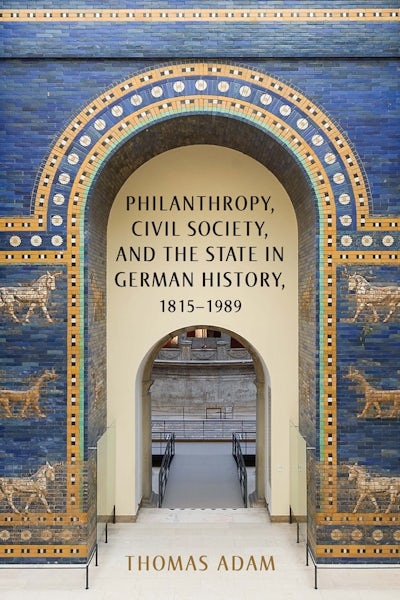
Title Details
234 Pages
22.8 x 15.2 cm
3 b/w illus.
Series: German History in Context
Series Vol. Number:
5
Imprint: Camden House
Philanthropy, Civil Society, and the State in German History, 1815-1989
- Description
- Contents
- Reviews
The first book to provide the English-speaking reader with the revisionist interpretation of the role of the state and philanthropy in Germany that is increasingly embraced by German historians.
Largely unnoticed among English-speaking scholars of German history, a major shift in interpretation of German history has been underway during the past three decades among German historians of Germany. While American and British historians continue to subscribe to an interpretation of German society as state centered, their German counterparts have begun to embrace an interpretation in which nineteenth- and twentieth-century German society was characterized by private initiative and a vibrant civil society. Public institutions such as museums, high schools, universities, hospitals, and charities relied heavily on the support of wealthy donors. State funding for universitiesand high schools, for instance, accounted only for a fragment of the operating costs of those institutions, while private endowments running into the millions of marks funded scholarships as well as health care for teachers and students. Private support for public institutions was essential for their existence and survival: it was the backbone of Germany's civil society. This book is the first to provide the English-speaking reader with this revisionist interpretation of the role of the state and philanthropy in nineteenth- and twentieth-century Germany: a society in which private actors claimed responsibility for the common good and used philanthropic engagement to shape societyaccording to their visions.
.
Thomas Adam is Professor of History at the University of Texas at Arlington. He has published extensively in the field of transnational history and the history of philanthropy.
Largely unnoticed among English-speaking scholars of German history, a major shift in interpretation of German history has been underway during the past three decades among German historians of Germany. While American and British historians continue to subscribe to an interpretation of German society as state centered, their German counterparts have begun to embrace an interpretation in which nineteenth- and twentieth-century German society was characterized by private initiative and a vibrant civil society. Public institutions such as museums, high schools, universities, hospitals, and charities relied heavily on the support of wealthy donors. State funding for universitiesand high schools, for instance, accounted only for a fragment of the operating costs of those institutions, while private endowments running into the millions of marks funded scholarships as well as health care for teachers and students. Private support for public institutions was essential for their existence and survival: it was the backbone of Germany's civil society. This book is the first to provide the English-speaking reader with this revisionist interpretation of the role of the state and philanthropy in nineteenth- and twentieth-century Germany: a society in which private actors claimed responsibility for the common good and used philanthropic engagement to shape societyaccording to their visions.
.
Thomas Adam is Professor of History at the University of Texas at Arlington. He has published extensively in the field of transnational history and the history of philanthropy.
Preface
Introduction
The Competition between Nobility and Bourgeoisie for Dominance over Arts and Culture
The Role of Donors in Shaping the Intellectual Elite
Private Funding for National Research Projects and Institutes
Philanthropy and the Shaping of the Working-Class Family
Civil Society in an Authoritarian State: German Philanthropy on the Eve of the First World War
The Slow Decline of Philanthropy and Civil Society
Conclusion
Notes
Selected Bibliography
Index
Introduction
The Competition between Nobility and Bourgeoisie for Dominance over Arts and Culture
The Role of Donors in Shaping the Intellectual Elite
Private Funding for National Research Projects and Institutes
Philanthropy and the Shaping of the Working-Class Family
Civil Society in an Authoritarian State: German Philanthropy on the Eve of the First World War
The Slow Decline of Philanthropy and Civil Society
Conclusion
Notes
Selected Bibliography
Index
"The first really comprehensive history of modern German philanthropy. It will be indispensable to anyone who is interested in the subject from now on." JOURNAL OF EUROPEAN STUDIES
"Adam provides historians of the Kaiserreich with a new insight into how its robust civil society co-existed with an authoritarian state, and perhaps reinforced it." GERMAN HISTORY
"In his fascinating new book . . . Thomas Adam sets out to revise the view of 19th- and 20th-century Germany as a state-centered society . . . . [T]he reader [learns] that 19th-century philanthropy in Germany was not . . . so much different from its contemporaneous counterparts in Britain and the United States. . . . Adam also has a second target in his crosshairs: Alexis de Tocqueville . . . and the thesis linking civil society and democratization." HISTPHIL
"Provide[s] the reader with a useful new lens through which to survey the philanthropic landscape of the Kaiserreich and beyond . . . ." MODERN LANGUAGE REVIEW
Hardcover
9781571139214
June 2016
$105.00 / £90.00
Ebook (EPDF)
9781782046752
June 2016
$29.95 / £24.99
Title Details
234 Pages
2.28 x 1.52 cm
3 b/w illus.
Series: German History in Context
Series Vol. Number:
5
Imprint: Camden House










